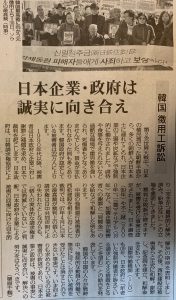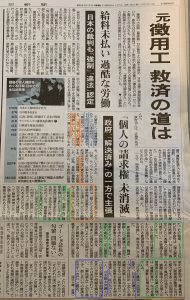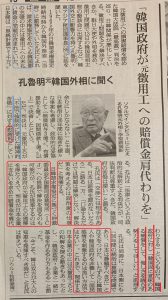第二次大戦中の日本と韓国の問題では、国家間の紛争処理は一応の解決を見たとはいえ、個人が受けた被害を誰が補償すべきかについては別のいろいろな問題があり、世界の民主主義に関する諸議論の趨勢により、考え方が変わることも当然ある。
日本企業に徴用された韓国の人々が裁判により補償を求めたことに、日本政府、企業、一部市民は批判的だが、かつて原爆の被害を日本政府に訴えた日本人に対し、日本政府は「原因を作った米国政府に訴えるのが筋だ」と言ったという。(実行したかどうか、聞いたことがないが。。。。)また、韓国に資産を残した日本人が補償を日本政府に求めた際は「韓国政府に請求すべき」と言ったという。
どのように、解決されるのだろうか?
Japan still struggles to escape its wartime past
South Korean court revives disputes that should have been settled long ago
Japan’s Prime Minister Shinzo Abe has the power to act boldly in addressing the country’s wartime past. © Reuters
Memories may fade, but history does not die away so easily, especially when competing versions of the past are at stake.
So, it is hardly a surprise that Japan’s controversial Second World War record has once more been thrust into the limelight.
In the latest development, on Oct. 30, the South Korean Supreme Court ordered Nippon Steel & Sumitomo Metal, two Japanese manufacturing companies active in the war, to pay $88,000 each to four Koreans as compensation for unpaid work between 1941 and 1943.Far from trying to defuse the situation, Japanese Prime Minister Shinzo Abe immediately rejected the ruling, called it “impossible under international law.”
When a quiet response might have reaped results — and won time for reflection — Abe pledged to hang tough, saying Tokyo “will handle this situation with firmness.”
Japan argues that a 1965 Tokyo-Seoul treaty covers all manner of past sins. It normalized bilateral relations tainted by 35 years of colonial rule in Korea from 1910 to 1945. From Tokyo’s standpoint, all issues concerning wartime labor were resolved 53 years ago and it is time Asia moved on.
Fair or not, that narrative is not traveling or aging well. If a court ruling involving four people (three of whom are dead) makes Abe and other Japanese nationalists squirm, imagine what lies in store if more Korean claimants pile in. Or if Chinese victims of Japanese rule again make their voices heard with Beijing egging them on.
Nor, unfortunately for Tokyo, is concern about Japan’s wartime past limited to Northeast Asia. In the U.S., for example, Korean-Americans, are becoming quite skilled at hitting a particularly sensitive target: wartime “comfort women.” Last month, Osaka ended its sister city relationship with San Francisco over a monument to wartime sex slaves — a description not accepted by Japan.
With Tokyo still unable to reconcile its historical narrative with those of countries that it once occupied, the arguments will continue to cast an awkward shadow over present-day Japan, and Abe’s efforts to reassert Japan’s international influence.
Abe may technically be correct to argue that the 1965 treaty was final, but the law often does not have the last word in these painful historical disputes. Public pressure forced German companies to pay compensation to wartime forced laborers in the 1990s, long after the German government signed similar government-to-government agreements.
Moreover, Japan will be under particular international scrutiny over the next two years as it stages two global events important for its soft power — the 2019 Rugby World Cup and 2020 Summer Olympics.
If Abe’s team handles the Seoul court setback badly, it could create a fresh opening for international debate over World War II questions Tokyo would prefer see closed.
Bashing the neighbors for domestic gain is a tried-and-true North Asian strategy. It could reemerge given how both South Korean president Moon and Chinese leader Xi Jinping find themselves in precarious situations at home.
Moon faces a slowing economy and growing anger over his preoccupation with North Korean detente. While an important endeavor, Moon was elected in May 2017 to rein in the excesses of family-owned conglomerates and pivot to a “trickle-up” economic model. Moon’s neglect of major reforms is depressing support for his administration. What better way than rally enthusiasm than bashing Japan?
Moon’s left-leaning government earlier upended the 2015 comfort women deal Abe forged with his predecessor Park Geun-hye. Moon claimed a vast majority of Koreans “cannot emotionally accept” a deal many felt lacked sincerity — or teeth, given the paltry 1 billion yen ($8.8 million) provided for a victims’ fund.
We will see how Moon’s party plays the issue going forward. One potential flashpoint: next year’s 100th anniversary of the so-called March First Movement. Moon has set up a task force to plan the commemoration of a historic uprising against Japan’s annexation.
But it is high time Japan raised its diplomatic game. For starters, Tokyo should accept the Korean Supreme Court ruling rather than lashing out as if an international body can intervene and overturn the judgment. Japan needs to realize, as Germany has long done, that below the legal element, these controversies have huge emotional and political depths.
My point here is not to compare Imperial Japan’s leaders with Adolf Hitler’s Nazis. But the historic tensions are getting in the way of the future. Something has been terribly lost in translation. Japan’s government feels it clearly and adequately atoned for the 1930s and 1940s. Yet the outside world has never quite warmed to that position.
The problem, says Jeff Kingston, director of Asian studies at Temple University Japan, is Tokyo’s “been there, done that” approach.
Abe hardly seems ideal for finding new ways to reconciliation. His obsession with a “beautiful Japan” has long been freighted with nationalism — from more patriotic school curricula to revising the pacifist postwar constitution so Tokyo can field a conventional military.
But this hawkish leader rightly seeks to open Japan. He has signed free-trade deals, eased curbs on immigration, highlighted the need for more women in the workforce and, yes, worked to mend fences with neighbors. The urgency for such steps is increasing with President Donald Trump’s trade war.
To “escape the shackles of the past,” Kingston says, Tokyo “needs to be humble about history. The future depends on managing the shared past.”
For Japan, this must start at home. Tokyo’s principal museum recording the Second World War is located at the Yasukuni Shrine where millions of dead soldiers are enshrined, including convicted war criminals headed by Gen. Hideki Tojo, the wartime prime minister. The museum’s view is nationalist, to put it mildly, with only limited references to Japanese atrocities. It is time to prepare a more balanced public record.
One unavoidable discussion: reparations, which Tokyo has long dreaded. It has preferred to keep its head down, lavish overseas development assistance around Asia and hope things blow over.
The Seoul ruling is a reminder that they are not going away. Some 70 Japanese companies, including Mitsubishi Heavy Industries, face unpalatable judgments in 15 similar cases.
As the strongest Japanese leader in decades, Abe has the power to act boldly. No one really expects him to follow Willy Brandt and fall to his knees in remorse as did the German statesman in Warsaw in 1970.
But moving beyond Japan’s wartime legacy requires serious action. Otherwise, Abe will struggle to burnish his stature as a world leader — and Tokyo will be hit by new damaging court rulings.

William Pesek is an award-winning Tokyo-based journalist and author of “Japanization: What the World Can Learn from Japan’s Lost Decades.” He was given the 2018 prize for excellence in opinion writing by the Society of Publishers in Asia, for his work for the Nikkei Asian Review
日本弁護士「強制徴用賠償、ICJでも日本が負ける」…その根拠は?
日本の弁護士約100人が韓国大法院(最高裁に相当)の徴用賠償判決に対する自国政府の対応を批判して問題解決を促した。
川上詩朗弁護士と山本晴太弁護士は今月5日、東京千代田区にある参議院議員会館会議室で「元徴用工の韓国大法院判決に対する弁護士有志声明」を発表した。
2人は「日本が国際司法裁判所(ICJ)に提訴する場合、日本が敗れる可能性が高い」としながら「被害者が納得して社会的にも容認された解決内容が必要だ」と主張した。
日本の弁護士は強制徴用賠償問題の本質は「人権問題」と指摘して「被害者の個人請求権は消滅していない」と強調した。
弁護士は2007年に中国被害者が起こした損害賠償請求訴訟を事例として挙げた。
当時、日本の最高裁判所は中国被害者に「裁判上、権利が喪失した」として原告敗訴判決を下したが「請求権は消滅していない」と明らかにした点を根拠に挙げた。つまり、日本政府側も1991年中国側に韓国大法院と類似の立場を明らかにしたと説明した。
あわせて「被害者個人の請求権が消滅していないうえに国際法上でも被害者は裁判を受ける権利がある」とし「このために日本が国際司法裁判所に提訴しても日本が敗れる可能性が大きい」と明らかにした。
弁護士は「被害者と社会が受け入れることができない国家間合意は真の解決になりえない」」と声を高めた。
この日、代表として出席した川上弁護士は「今回の韓国最高裁の判決に対して『国際法上あり得ない』と述べた安倍晋三首相の発言に違和感を感じて緊急声明を発表する」とし「急意で用意された声明で、現在まで100人余りが参加した」と明らかにした。
この日配布された共同声明資料には、弁護士89人や学者6人など合計95人が署名したと記録されており、意見を同じくする弁護士は増え続けているという。
一方、日本政府は韓国大法院の強制徴用賠償判決に関連し、韓国を国際司法裁判所に単独提訴する方針だと産経新聞が6日、報じた。同紙は、大法院が新日鉄住金(旧・新日本製鉄))に命じた損害賠償を韓国政府が代わりに履行するなどの措置を取らない場合を仮定してこのような方針を固めたと説明した。
これとあわせて、日本政府は在外公館を通じて自国の立場を海外各国に知らせるなど海外メディアを通した世論戦を本格化する様相だ。
河野太郎外相は大法院判決直後「極めて遺憾であり、断じて受け入れられない」という談話を発表した後、連日強硬発言を繰り返している。外信インタビューで、韓国大法院の強制徴用賠償判決を中傷する一方、記者団との会見では「(韓国大法院の強制徴用賠償判決は)暴挙であり国際秩序に対する挑戦」と主張した。
日本政府は「個人の請求権は1965年韓日請求権協定で消滅していない」という韓国大法院の判決趣旨は説明せずに韓国が協定を破ったと強調している。
これを通じて、国際社会における韓国の信頼度を落とそうとしているのではないかという分析がある。
これについて韓国外交部は「我々の司法府判断に対して節制されていない言葉で評価をするなど、過剰対応していることに対し、甚だ遺憾だと言わざるを得ない」とし「三権分立の基本原則に則り、行政府は司法府の判断を尊重するのは当然で、これは日本を含めてどの自由民主主義国家も例外であるはずがない」と指摘した。
11/30





 11/20頃
11/20頃